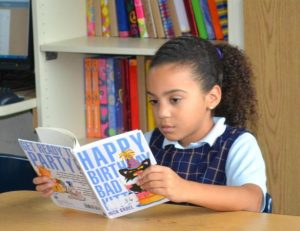 Our Philosophy
Our Philosophy
Our St. Francis School Elementary program continues to nurture the Catholic values instilled at home while providing students with a strong academic curriculum. Students learn about God’s love through daily religion lessons and classroom experiences. Parents and teachers work cooperatively to build a partnership between home and school.
A strong core academic curriculum is the main focus of the third grade. In addition to the core curriculum, a wide range of instructional methods are offered to help the children learn both formally and informally. The third-grade curriculum is an integration of skills learned in Kindergarten through second grade. It enhances these skills through an in-depth understanding of process and procedure. The St. Francis curriculum meets both state and Diocese benchmarks and standards for the third grade.
For the students’ personal growth, third grade incorporates the Catholic faith to provide students with a basis for personal and team growth. We focus on the following:
- Respect for others
- Following directions and rules
- Responsibility for one’s own actions
- Personal independance
Third-Grade Curriculum
St. Francis offers a strong and varied academic curriculum for third grade students.
Religion
Catholic faith is taught throughout the year with the assistance of a textbook. Be My Disciples encourages the lessons and lifestyles that Catholics should practice. In addition to classroom prayer and teacher guidance, the text provides a historical perspective on the Catholic faith. We show Jesus that we love and respect the awesome gift of His true presence in the Eucharist as we participate in Eucharistic Adoration each week. Additionally, we are also focusing on the prayers all Catholics should know by heart. Lastly, we incorporate instruction on the organization of the Bible and how to locate specific books, chapters, and verses.
Reading
We work to develop a more in-depth understanding of literature through structured literature circles, guided reading sessions, and independent reading. Reading instruction consists of developing vocabulary, building strategies to comprehend text, and appreciating various types of literature.
Phonics and Spelling
Third grade uses the Spelling Connects program by Zaner-Bloser to instruct students in Phonics and Spelling. Explicit instruction of letter-sound relationships helps students refine their word attack skills in reading and spelling. Through this program, students will be exposed to instruction on digraphs, blends, vowel combinations, prefixes, suffixes, base words and word meanings.
Handwriting
All third-grade students receive instruction in cursive handwriting and are given time to practice and develop their newly acquired skills throughout the school year. Students are encouraged to use cursive in some of their classwork by January. The Zaner-Bloser Handwriting curriculum guides the instruction and growth of cursive handwriting.
Writing/Grammar
In third grade, students practice the writing process of prewriting, first drafts, revision, editing, and publishing. They also build on previous knowledge of the traits of writing. In third grade, students work to integrate ideas, organization, voice, word choice, sentence fluency, and conventions into writing pieces of various genres. The writing curriculum is supplemented with instruction in grammar. Throughout the year, students focus on sentence development, nouns, verbs, adjectives, adverbs, punctuation, and pronouns. The integration of grammar and writing provides a strong foundation for success in writing and speaking.
Math
The third-grade math curriculum provides students with valuable skills to use mathematics in and out of the classroom. Teachers use a math textbook My Math (Macmillan McGraw Hill) to guide their math lessons but supplement materials and instruction as necessary to address student needs. One major focus in our program is the mastery of multiplication facts and the introduction of division facts. We practice an interactive approach for learning math skills with the help of hands-on and manipulatives. There are many topics that we visit throughout the year including adding and subtracting whole numbers and money, using geometry, multiplication and division, fractions, and measurement using both US standard and metric units.
By pre-assessing students before each new topic of study we are able to evaluate the abilities of each student and utilize a math enrichment teacher to provide each child with the support or advancement they need.
Social Studies
Social studies is an integral key to becoming active citizens of our world. In third grade Social Studies focuses on Michigan’s history. We use the text Meet Michigan to learn about the State of Michigan through a mixture of informational and narrative text. We explore the early history of Michigan, the steps of statehood, and the major events and people who have impacted our state, and the basic structure of our current government. The highlight of our year is traveling to Lansing to visit the State Capitol and the Michigan History Museum!
Science
The science curriculum using Mystery Science is taught with a balance of hands-on activities and solid content knowledge. The scientific process, critical thinking, and scientific reasoning are used to make predictions and observations, solve problems and answer questions. Through scientific inquiry, major topics from the Next Generation Science Standards in the areas of life science, earth science and physical science will be explored.
Enrichment
Spanish
Students in third-grade Spanish continue to develop their writing and listening skills. More extensive vocabulary is introduced along with adjectives that express emotions. Students learn parts of the body and face and clothing vocabulary, as well as apply grammatical rules to form nouns that agree in gender and quantity. Students also learn about the Hispanic culture and Catholic faith with short prayers, songs and traditions.
Specials
Each week our third graders participate in art, music, and PE. The children also benefit from participation in the Christmas program and the option of Elementary School Choir.
Recess/Lunch
Every day, third graders enjoy two 20 minute outdoor recess times; one in the morning and one following their 25 minute lunch period. Lunch and midday recess are supervised by parent helpers.